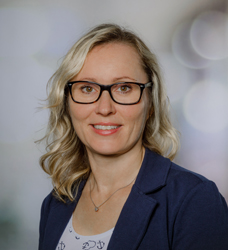Prof. Dr.-Ing. habil. Manja Krüger
 |
Prof. Krüger studied Mechanical Engineering at the OVGU and received her doctorate in 2010 on the subject of "Powder metallurgical production and characterization of oxidation-resistant molybdenum-based alloys for high-temperature applications". After working as a professor at RWTH Aachen University and heading the “Mechanics of Materials” department at the Forschungszentrum Jülich, she is now a professor for high-temperature materials at the OVGU. Motto: If you always do what you’ve always done, you’ll always get what you’ve always got. -Henry Ford |
Career
|
Education: |
Graduated in 2004 |
Degree in Mechanical Engineering with a specialization in Materials Technology, Otto von Guericke University Magdeburg |
|
Doctorate: |
2010 |
Otto von Guericke University Magdeburg, awarded the OVGU dissertation award and the Karin Witte Foundation award |
|
Habilitation: |
2017 |
on the subject of "Innovative metallic high-temperature materials", Otto von Guericke University Magdeburg |
|
Work: |
2004-2010 |
Research Assistant at the Institute for Material and Joining Technology, Otto von Guericke University Magdeburg |
|
2008 |
Visiting scholar at Brown University, Providence, USA |
|
|
2010-2011 |
Post-doctoral student at the Institute for Materials and Joining Technology at OVGU |
|
|
2012-2017 |
Junior professor for special metallic materials at the OVGU |
|
|
2017-2019
|
Professor of Mechanics of Materials at RWTH Aachen and Head of department at Forschungszentrum Jülich GmbH | |
|
since Okt 2019 |
Professor for high temperature materials at the OVGU Magdeburg |
After graduating from high school, I was initially undecided which course to choose, as there were a large number of subjects and study locations to choose from. Ultimately, I decided to study Mechanical Engineering because I was interested in technical issues and the logical approach to solving problems.
Today I am engaged in the research and development of new materials that have to be “tailor-made” for complex technical applications. These are, for example, materials that enable more efficient and resource-saving mobility for the population and optimize processes in energy technology, or materials for medical technology on which human cell cultures can grow.
Motivation
I chose the subject because I am enthusiastic about the different issues within materials technology and materials science and at the same time they are economically and socially relevant for various areas.
What I enjoy most about my work is developing creative approaches to solving material-related problems and then materializing them in the laboratory. Our approaches often relate to the transfer of fundamental material engineering and metal-physical mechanisms to issues in the industry. The most innovative ideas have already been patented.
Requirements
I can recommend studying Mechanical Engineering with its various specialist branches to those who are enthusiastic about technical issues and want to work in a solution-oriented manner. Engineers can work in many areas. An example: My sister and I both studied Mechanical Engineering and later earned our doctorates. Today she works on the management level of an automotive company and I am a professor for high-temperature materials.
From my point of view, qualities such as analytical skills, having fun identifying and solving problems, but also creativity and good intuition are in demand in our professional field.
Advice
Only very few tasks in the day-to-day work of engineers can be solved according to a fixed scheme; thinking that is “outside-of-the-box” are often required. However, nobody should have the wrong ambition to have to overcome all the hurdles alone. Getting support and advice from friends, fellow students, teammates, or mentors often helps to cope with problems.
Challenges
In the course of my career I was able to fall back on a functioning network of supporters. First and foremost, this is my family, in which the question never came up whether a degree in Mechanical Engineering was the right thing for a girl.
In addition, my lecturers motivated me a lot during my studies and made sure that my initial enthusiasm was maintained. Role models help to make young women aware of technical subjects. The numbers speak for themselves: 45% of the people currently working as doctoral or post-doctoral students at my chair are women.







